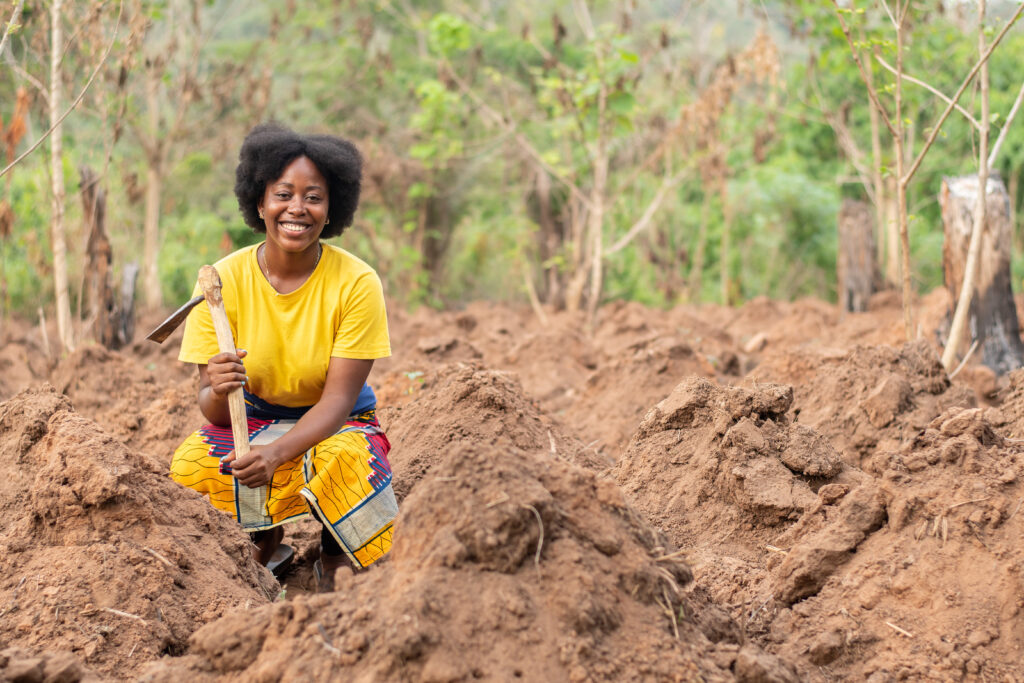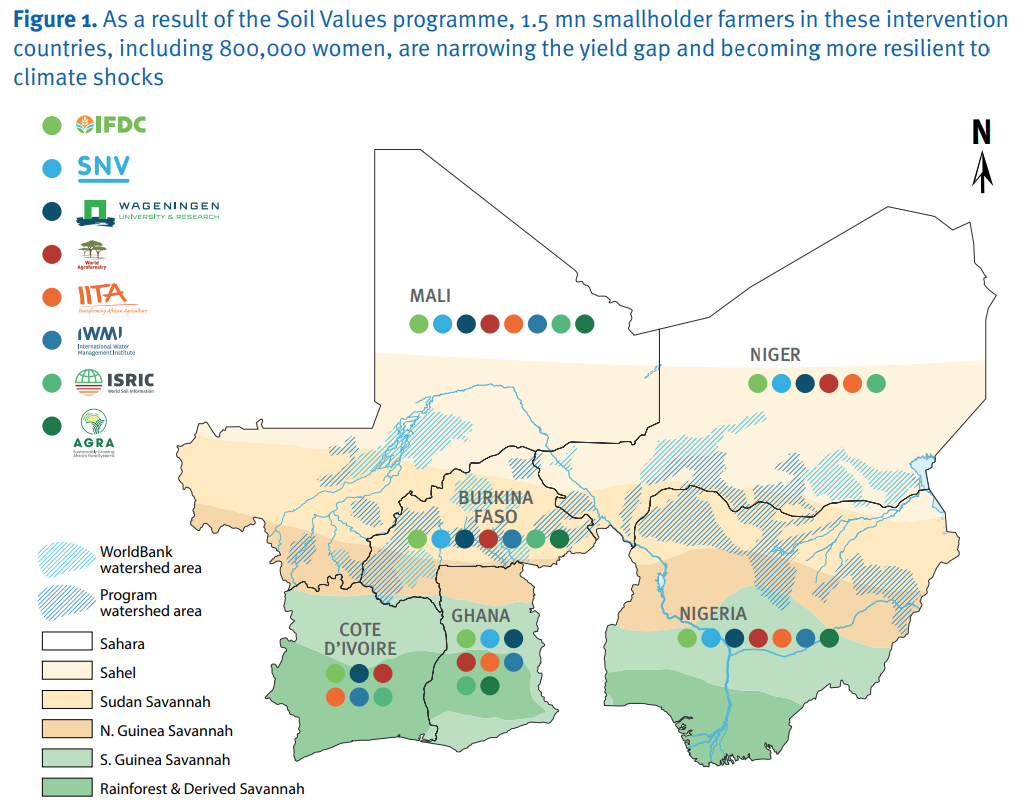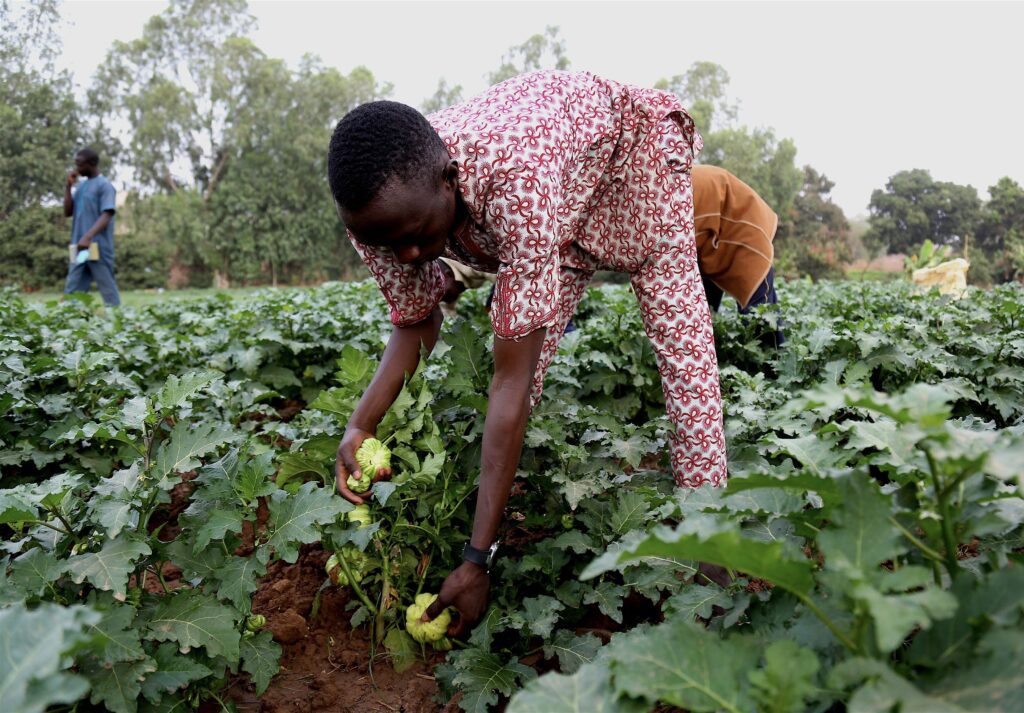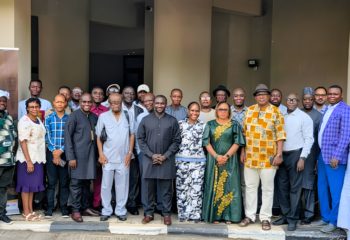
This article was originally featured in Argus Media’s Fertilizer Focus May/June 2024 publication.
Argus Media is the leading independent provider of market intelligence to the global energy and commodity markets, offering essential price assessments, news, analytics, consulting services, data science tools, and industry conferences to illuminate complex and opaque commodity markets.
Follow Argus Media on Social Media.
Written by Alimata Arzouma Bandaogo, Deputy Program Director, Technical, Soil Values Program; Mariano Dossou-Kpanou, Corporate Monitoring, Evaluation, and Learning Coordinator; Olga Kokode, Regional Communications Coordinator; Evariste Léon Gbaguidi, Communication Specialist, Soil Values Program; and Diro Bénoit Wilfried Toe, Senior Communications Coordinator, Soil Values Program.
Soil degradation has a considerable impact on agricultural productivity in West Africa. It is mainly linked to two factors: one associated with climate shifts and the other linked to anthropic factors (expansion of crops, poor cultivation practices, and overgrazing). This is a worrying situation, as communities in West Africa already struggle daily to feed themselves.
Several initiatives have been developed through agricultural policies and resilience and food security programmes such as West Africa Food System Resilience Program (FRSP), Agricultural Resilience and Competitiveness Project (PRECA), and the Regional Sahel Pastoralism Support Project (PRAPS) seek to achieve food security for populations in a context of climate shifts. However, the agricultural sector continues to face many challenges linked to the sustainable management of soil fertility and soil health. Soil Values aims to provide solutions through synergies with existing programs and a community-based approach at watershed scale.
The programme aims to sustainably improve soil fertility to increase food production and strengthen the resilience of agricultural producers in the face of climate shifts by promoting sustainable approaches and technologies.
Challenges to food security and smallholder resilience in Africa
According to estimates presented in the most recent edition of The State of Food Security and Nutrition in the World, published in July 2022, the number of undernourished people in the world increased to 828 mn in 2021. Smallholders, whose resilience has been tested by multiple shocks, are particularly vulnerable. In Africa, 70-80% of them rely on agriculture and renewable natural resources for income, employment, food, nutrition, and overall well-being. Human-induced degradation affects 35% of agricultural land (1,660 mn hectares), and a fifth of the land degraded by human activities is in sub-Saharan Africa.
An invaluable resource, soil is the foundation of agriculture, livestock farming, ecosystems, and livelihoods. The sustainable use of this potential promises to transform the future of the region, where food scarcity is giving way to increased agricultural productivity and greater household resilience.

According to FAO STAT 2022 data, soils are the basis to produce over 95% of our food. Healthy soils store the largest quantities of fresh water, nutrients, and carbon of any biome, with interactions between plants and microbes facilitating the absorption of water and nutrients needed for plant growth. All these elements are conducive to enhancing soil fertility and boosting agricultural production in the Sahel.
Low agricultural productivity can be attributed to several factors, including soil degradation, the small size of farms, and the use of rudimentary technologies. A range of innovative technologies has been developed to manage soil fertility, improve systems, and increase farmers’ resilience. However, the agricultural sector in Africa is slow to meet the growing demand for food. Many questions are being asked about the catalysts that need to be activated, the synergies that need to be created between agricultural programmes, and the players that need to be involved to achieve real development in the agricultural sector.
Supporting farmers in improving soil fertility
The lack of nutrients and the use of organic and mineral fertilizers have affected soil health, agricultural productivity, and the region’s economic transformation. Decision-makers and ministers of agriculture and finance met in Lomé, Togo, on 30-31 May 2023, for a high-level round table organized jointly by the Economic Community of West African States (ECOWAS) and the Togolese presidency, with the support of the World Bank Group and the International Fertilizer Development Center (IFDC).
At the end of the meeting, industry leaders and development partners of the Regional Agency for Agriculture and Food in West Africa (RAAF) reaffirmed their support for an innovative and integrated approach to sustainable soil fertility management. The regional leaders approved a declaration covering a series of concrete objectives and measures, including urgently improving access to mineral and organic fertilizers for small-scale farmers, with a focus on climate-resilient crops to ensure food security for the region’s inhabitants. A second approved objective is to strengthen research and development systems in the field of sustainable land management, including through the adoption of new technologies.
Commenting on the role of fertilizer in soil fertility, President of Togo Faure Gnassingbé said, “Without a vision and a strategy, fertilizers quickly go from promising to restore the soil to causing it to deteriorate. Given the need to strike the right balance, government planning and involvement are essential. That’s why I’m in favour of regional planning.”
According to a press release published on the World Bank’s website on 11 January 2021, the organization plans to commit more than USD5 bn to the development of the agricultural sector. This involves continued support for the reforms needed to improve soil health and strengthen the fertilizer sector in terms of subsidy management, quality control, and traceability through development policy operations and green fertilizer production projects.
Soil Values will strengthen financing of input value chains
The Netherlands Directorate-General for International Cooperation (DGIS) has launched the Soil Fertility Grant Program (SFGP) to support initiatives on sustainable soil fertility management and contribute to ecologically sustainable improvements in food productivity and increased resilience of small-scale food producers in the Sahel.
Soil values, a major soil fertility management programme in the Sahel
Soil Values is a programme funded by DGIS to support farmers in adopting sustainable soil fertility management practices in the Sahel. Over the next 10 years, the programme will seek to improve the fertility of 2 mn hectares of farmland and enhance the production capacity and resilience of 1.5 mn farmers in four Sahelian countries: Burkina Faso, Mali, Niger, and northern Nigeria.

The Soil Values programme focuses on the adoption of an Integrated Soil Fertility Management (ISFM) approach within a participatory landscape management framework. This initiative aims to stimulate sustainable profitability assessments and promote the widespread adoption of proven technologies and methods. ISFM generates productivity gains, increased resilience, and mitigation benefits. It utilizes a set of practices related to fertilizers, organic resources, and other amendments on smallholder farms to increase production and input use efficiency.
Emphasizing the need to value soil fertility, Dr. Bidjokazo Fofana, Director of IFDC’s Soil Values programme stated, “Neglecting soil fertility risks compromising the ecological balance and degrading forest ecosystems. In addition, excessive fertilizer use can lead to groundwater pollution, affecting downstream communities. Despite its crucial role as the source of all production, soil lacks direct monetary value, which does not reflect its true importance.”
Soil Values will strengthen financing of input value chains, primarily through synergies with the African Fertilizer Financing Facility (AFFM) established by the African Development Bank (AfDB) and in collaboration with the fertilizer industry and the financial sector, which will facilitate the guarantee of commercial credit. Subsequently, Soil Values will support the delivery of inputs and training of all actors in the fertilizer value chain.
Development partners
According to a publication on ECOWAS’s website from 31 May 2023, the RAAF reported that the kingdom of the Netherlands has announced EUR100 mn to support the fertilizer sector in West Africa over the next decade. Soil Values intends to quadruple this budget by attracting more than EUR100 mn from development partners, more than EUR100 mn from the private sector, and more than EUR100 mn in funding from the fertilizer sector to improve soil fertility in the Sahel.
For its actions to be relevant, Soil Values needs to work with the ministries responsible for agriculture, the World Bank’s West Africa Food System Resilience Program (FSRP), and other local projects and programmes working on agricultural resilience in West Africa. These include the Toward Sustainable Clusters in Agribusiness through Learning in Entrepreneurship (2SCALE) programme, the Feed the Future Enhancing Growth through Regional Agricultural Input Systems (EnGRAIS) project for West Africa, the Fertilizer Sector Reform Support Project in Niger (PARSEN), and the Integrated Seed Sector Development in the Sahel (ISSD/Sahel) project.
Soil Values is implemented by IFDC, with lead partners SNV and Wageningen University and Research (WUR), as well as knowledge partners, such as AGRA, World Agroforestry (ICRAF), the International Institute of Tropical Agriculture (IITA), ISRIC – World Soil Information, and the International Water Management Institute (IWMI).




